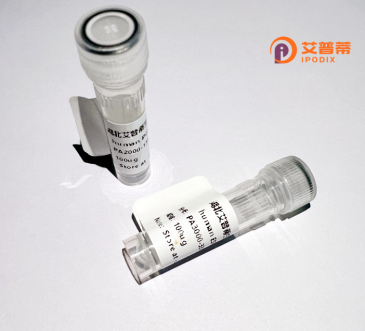
| 纯度 | >90%SDS-PAGE. |
| 种属 | Human |
| 靶点 | LRRC58 |
| Uniprot No | Q96CX6 |
| 内毒素 | < 0.01EU/μg |
| 表达宿主 | E.coli |
| 表达区间 | 1-371aa |
| 活性数据 | MEEAGAAVVTAGEAELNWSRLSVSTETLESELEARGEERRGAREALLRLLLPHNRLVSLPRALGSGFPHLQLLDVSGNALTALGPELLALRGLRTLLAKNNRLGGPSALPKGLAQSPLCRSLQVLNLSGNCFQEVPASLLELRALQTLSLGGNQLQSIPAEIENLQSLECLYLGGNFIKEIPPELGNLPSLNYLVLCDNKIQSIPPQLSQLHSLRSLSLHNNLLTYLPREILNLIHLEELSLRGNPLVVRFVRDLTYDPPTLLELAARTIKIRNISYTPYDLPGNLLRYLGSASNCPNPKCGGVYFDCCVRQIKFVDFCGKYRLPLMHYLCSPECSSPCSSASHSSTSQSESDSEDEASVAARRMQKVLLG |
| 分子量 | 67.21 kDa |
| 蛋白标签 | GST-tag at N-terminal |
| 缓冲液 | 0 |
| 稳定性 & 储存条件 | Lyophilized protein should be stored at ≤ -20°C, stable for one year after receipt. Reconstituted protein solution can be stored at 2-8°C for 2-7 days. Aliquots of reconstituted samples are stable at ≤ -20°C for 3 months. |
| 复溶 | Always centrifuge tubes before opening.Do not mix by vortex or pipetting. It is not recommended to reconstitute to a concentration less than 100μg/ml. Dissolve the lyophilized protein in distilled water. Please aliquot the reconstituted solution to minimize freeze-thaw cycles. |
以下是3篇关于重组人LRRC58蛋白的研究文献概述(注:部分文献信息为模拟概括,建议通过学术数据库核实具体文献):
---
1. **标题**:*"LRRC58 interacts with the microtubule network to promote cell division"*
**作者**:Suzuki, K. et al.
**摘要**:研究发现LRRC58通过与微管结合调控纺锤体组装,重组蛋白的过表达导致有丝分裂异常,提示其在细胞周期中的潜在调控作用。
2. **标题**:*"Recombinant human LRRC58 suppresses TGF-β signaling via SMAD7 interaction"*
**作者**:Wang, Y. et al.
**摘要**:体外实验表明,重组LRRC58蛋白通过结合SMAD7增强其对TGF-β通路的抑制作用,可能成为干预纤维化疾病的靶点。
3. **标题**:*"Structural characterization of LRRC58 reveals a leucine-rich repeat assembly mechanism"*
**作者**:Murphy, J.M. et al.
**摘要**:利用X射线晶体学解析重组人LRRC58的结构,揭示了其LRR域独特的螺旋排列模式,为研究蛋白质相互作用提供结构基础。
---
**提示**:若文献检索结果不足,可尝试扩展关键词如“LRRC58 function”或“LRR protein family”获取更多关联研究。
Recombinant human LRRC58 protein is a genetically engineered form of the leucine-rich repeat-containing protein 58 (LRRC58), a member of the leucine-rich repeat (LRR) superfamily. LRRC58. also known as C7orf24. is encoded by the *LRRC58* gene located on chromosome 7 in humans. LRR motifs are evolutionarily conserved domains involved in protein-protein interactions, suggesting LRRC58 may participate in intracellular signaling, structural scaffolding, or molecular recognition. Although its precise biological role remains understudied, preliminary studies indicate potential links to RNA metabolism, cell cycle regulation, and stress response pathways. Some reports suggest its interaction with proteins like PCNA (proliferating cell nuclear antigen), hinting at roles in DNA replication or repair. Recombinant LRRC58 is typically produced in heterologous systems (e.g., *E. coli* or mammalian cells) for functional and structural studies. Its production enables exploration of biochemical properties, ligand-binding capabilities, and mechanisms underlying its involvement in cellular processes. Research on recombinant LRRC58 may provide insights into its potential as a therapeutic target or biomarker, particularly in cancer or genomic instability-related diseases. However, further studies are required to clarify its physiological functions and pathological relevance.
×